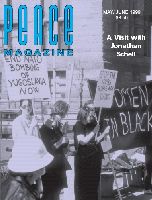
Peace Magazine May-June 1999, page 26. Some rights reserved.
Search for other articles by Robert Stewart here
The research on peace is diverse and extensive. We currently have the knowledge, technology and infrastructure to achieve peace. The problem is motivation and leadership.
On the basis of rigorous scientific evidence, the Seville Statement of 1986 refutes the myth that human beings are predisposed to violence through five key propositions.
For these reasons and more, peace is achievable.
The Peace Formula
What, then, is the formula for peace? The following variables must be in place:
These five measurable, and hence manageable, factors are in place to varying degrees in every nation. By strengthening these factors, the world would become more peaceful.
Motivation: Leadership
From the top down, research is overwhelmingly in support of a new world order. This planet, in the past century, has become too small and its limitations too apparent for us not to realize that the world's populace must act together. We have a global problem that will require a global solution. This will take leadership at the international level . The United Nations must provide this leadership. However, it would have to be reformed to undertake this onorous responsibility.
Current national foreign policies must also change. For example, social justice, as a goal urged by the United Nations, refers to striving for equality between entire peoples. However, a global attack on global poverty cannot be launched without radically changing the current trade patterns and financial arrangements between the affluent and impoverished worlds and without expressly disavowing national policies of the sort proposed shortly after World War II by George F. Kennan, whose "containment strategy" dominated U.S. foreign policy. At that time he said: "We have about 50% of the world's wealth, but only about 6.3% of its population. In this situation we cannot fail to be the object of envy and resentment. Our real task ... is to devise a pattern of relationships which will permit us to maintain this position of disparity without detriment to our national security... We need not deceive ourselves that we can afford ... the luxury of altruism ... We should cease to talk about ... unreal objectives such as human rights, the rising of living standards and democratization. The day is not far off when we are going to deal in straight power concepts."
If the United Nations fails, the globe will be at tremendous risk. Only the rich and powerful may prosper, temporarily. Although the planet is not at the brink yet, we may be there within fifty years, and it is timely for world leaders to make a choice now.
Motivation: Civil Society
From the bottom up, today more than ever before, civil society is experiencing a proliferation of non-governmental organizations in which individuals can engage in non-violent action for peace and justice. With the emerging world communication network, they are increasingly able to link their struggles on a global scale. Among the thousands of NGOs working for peace, many are adopting the culture of peace as an explicit priority.
Peace is possible. There are actions that may be taken to help achieve it.
Robert Stewart, C.A., directs the Canadian Centres for Teaching Peace. Respond to him at <stewartr peace.ca>.
Relevant Web Sites
The Seville Statement <http://www.unesco.org/general/eng/publish/order.html>
UNESCO Culture of Peace <http://www.unesco.org/cpphttp://www.unesco.org/cpp/uk/leaflet/leaflet.html>
Canadian Centres for Teaching Peace web site at <http://www.peace.ca>
Universal Declaration of Human Rights <http://www.udhr50.org/UDHR/default.htm>
Universal Declaration of Human Responsibilities proposal <http://www.asiawide.or.jp/iac/Declara1/EngDecl1.htm>
International Crime Court <http://www.un.org/icc>
Hunger Project <http://www.thp.org>.
Public Action To Remedy Hunger, by Amartya Sen <http://www.thp.org/reports/sen/sen890.htm>
Warning to All of Humanity: <http://www.pgs.ca/woc/warning.htm>.
World Systems Crash Scenario visit <http://dieoff.org/>
"UNESCO and a Culture of Peace" <http://www.unesco.org/general/eng/publish/order.html>
The United Nations in the Twenty-first Century: <http://www.pgs.ca/woc/wdun2198.htm>
Conceptions of World Order by Anatol Rapoport <http://www.pgs.ca/woc/rapoport.htm>
United Nations <http://www.un.org>

Peace Magazine May-June 1999, page 26. Some rights reserved.
Search for other articles by Robert Stewart here